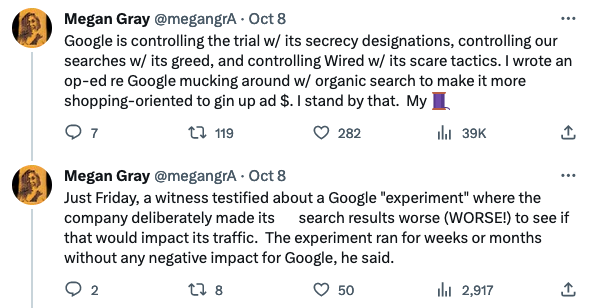Hey folks. Well, last week’s newsletter didn’t stand the test of time. It was anchored to a Wired op-ed piece that accused Google of fabricating costly search terms to bilk its advertising customers out of their campaign budgets. After withstanding attacks and takedown requests from Google’s legal team that began as soon as the column was published last Monday, it got pulled down a few hours after our email hit your inboxes. You’ll now see a note that says “the story does not meet our editorial standards” if you visit the Wired page where you could formerly read How Google Alters Search Queries to Get at Your Wallet (archive.org mirror).
 A lawyer named Megan Gray wrote the article. She’s an incredibly accomplished person with a reputation for choosing her words carefully. After two days of radio silence in the wake of her piece vanishing from Wired’s website, she posted 25 Xs (that’s how we’re supposed to say it now) in a minute. We recommend reading her thread for yourselves, but she essentially says that Google’s Search practices are actually worse than her article would lead you to believe. She rebuts Google’s response to her (in a nutshell: they deny everything) as well.
A lawyer named Megan Gray wrote the article. She’s an incredibly accomplished person with a reputation for choosing her words carefully. After two days of radio silence in the wake of her piece vanishing from Wired’s website, she posted 25 Xs (that’s how we’re supposed to say it now) in a minute. We recommend reading her thread for yourselves, but she essentially says that Google’s Search practices are actually worse than her article would lead you to believe. She rebuts Google’s response to her (in a nutshell: they deny everything) as well.
The Google Search Central YouTube channel recently introduced a new SEO Made Easy series. It’s hosted by Martin Splitt, a man who periodically popped up in prior videos on the channel and sometimes contributes to the Search Central blog. His Swiss-German accent might lead you to believe that you accidentally clicked into an SNL skit at first, but he’s planning to cover some useful information in the coming weeks.
The first video explained how to make your site name appear the way you want it to in Google Search results. We can expect future videos about improving page experience with lazy loading and how to find low-hanging fruit in Google Search Console. Martin asked for topic suggestions in the comments section of the announcement video, so submit your requests there if you have any.
A new Content Credentials icon was announced at an Adobe trade show on Tuesday. It looks like a speech bubble with “cr” in lowercase letters inside of it. The icon can be expanded to identify AI-generated images and videos. The goal of the new icon is to make digital content more trustworthy and transparent.
To be clear, the icon will also let people know when pictures and videos are unaltered and authentic. Digital cameras from most makers will begin inserting Content Credentials-compatible metadata into the photos they take in the near future and all of Adobe’s upcoming software will be capable of analyzing imagery to detect whether or not AI tools were used to generate any given picture or video. Microsoft is adopting the Content Credentials standards as well and many more hardware and software companies are expected to follow suit.
All right. Time for closing links. WordPress is explicitly seeking people in the SEO industry to participate in its annual survey. That’s something they’ve never done before. Affiliates and marketers who advertise on WordPress sites are encouraged to contribute as well. If there’s anything you’d like to speak up about like site speed or performance issues in general, this survey is your forum to voice those concerns. Past surveys have deeply influenced the leadership at WordPress.
The New Yorker released an excellent article on Monday called Why The Internet Isn’t Fun Anymore. It contains a laundry list of grievances against particular social networks, but its major point is that when a platform decays, there’s nothing comparable to step in and replace it. There are alternatives like Bluesky (and even Discord) that seek to absorb disaffected X users, but “like sproutlings on the rainforest floor, blocked by the canopy, online spaces that offer fresh experiences lack much room to grow.” This isn’t an uplifting read, but it’s a good one.
We’re going to finish up with something that’s not a link at all but an appeal to our readers to help us figure out what’s up with Squid Game. We finished watching it on Wednesday and find ourselves puzzled by its popularity. Don’t get us wrong– Squid Game wasn’t awful. We finished it. We just can’t wrap our minds around the international sensation it turned into.
We suppose it would’ve been hard for any TV series to satisfy our expectations after we learned that people put their lives on the line to watch it (a flash drive containing Squid Game earned one of Kim Jong Un’s adoring subjects an appointment with a firing squad), but this show seems mediocre in a vacuum. Unless we missed something obvious, we’re awarding Squid Game a spot in the overrated entertainment hall of fame somewhere between Cyberpunk 2077 and Breaking Bad.
That’s all for today. Be safe out there.



